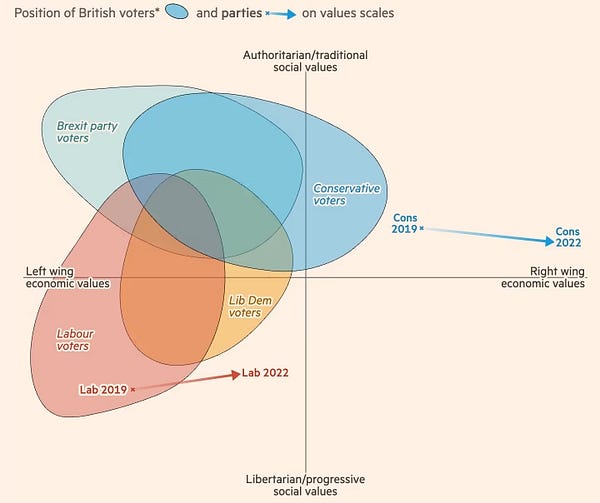Borkowski Weekly Media Trends 30-09-22
Truss' Nightmare Week | Eurovision's return | Twitch drama engulfing the platform
Who knew Truss could sink the country lower than Boris ever did?
What a week: Market meltdown. Pound crashing. Pension funds on the brink of collapse. £65 billion bailouts for markets. And for once, it’s not the banker’s fault; it’s No 10 and their downplayed ‘mini budget’.
It was supposed to be a small event announcing key growth plans and confirming household support through winter. But it turned into a political firestorm for the new Chancellor and PM.
With inflation booming, winter looming, and all but the rich counting the pennies, the government, in their clever comms and political minds, decided the best thing would be to cut taxes for the rich and assure that we’ll all be okay.
Sadly for the British public, Truss & Kwarteng are living in cuckoo land. They dropped the bomb and hid instead of defending their half-baked budget. Their radio silence was deafening. They disappeared hoping it would blow over rather than explain their fantasy economics horrifying everyone from the IMF, city traders and every expert going.
And the public agrees - look at the polling, which now has labour 33% ahead!

When they reappeared from under their rock, they thought a safe bet would be local radio stations, but they were misguided. These presenters rarely get first dibs and exclusives like this and grilled the PM far more ruthlessly than the usual political broadcast circuit. Yet they were fearless, delivering consecutive car crash interviews accompanied by hard-hitting questions and a speechless PM wracking up unanswered questions. FactCheck has been busy outlining all the inaccuracies from the disasterous interviews - misinforming listeners about her landmark energy policy.
The problem facing the Conservative Party is profound, and as the FT outlined, the party is getting further and further away from its voter bases.


Political pundits and lobbyists were hedging their bets. But, instead, they piled onto trains to Liverpool to snooze Labour policymakers this week - a sign maybe the Conservative government’s reign is declining. With the news, Tory headquarters are now saying the next election will be in January 2025; the outlook is bleak for Truss and the broader party.
Eurovision returns to the country
At long last, Eurovision is coming back to the United Kingdom. The final two cities in the running were announced this week, with Liverpool and Glasgow each making a strong claim for the competition, which the UK will host on behalf of winners Ukraine.
Eurovision brings excellent international attention to a place, and Liverpool and Glasgow are now making a case for why their city should be the host. Liverpool, a UNESCO City of Music since 2015, boasts unparalleled musical heritage in the Beatles, while Glasgow has produced winners such as Lulu in 1969.
No doubt, the competition will have a bittersweet flavour given the conflict, which makes it impossible for Ukraine to host the competition and shows no sign of ending soon. Moreover, Eurovision, which has always positioned itself as a ‘non-political’ exercise in international solidarity, has its own Wikipedia entry of political controversies in the competition. A strong sign of European soft power, the competition included Russia up until last year. However, now the competition has no way of shedding its distinctly political status by representing a continent both at war and rife with its own divisions.
Nonetheless, the positive PR from such an event makes it an appealing prospect for the host city. While Liverpool and Glasgow each have their own heritage to boast, it is safe to say that both will do a fabulous job hosting one of the year’s best and - traditionally at least - most lighthearted of parties. How the production balances a serious homage to the would-be host country, Ukraine, while preserving the event’s status as a light diversion remains to be seen.
Twitch sees its craziest-ever month, but are you watching?
September has been a rollercoaster ride for one of the world’s largest media brands: Twitch. The live streaming platform boasts over 100 million active users, and this month has been one of the most drama-filled Twitch has ever seen.
To most, names like xQc, TrainWrecksTV, and Pokimane might sound gibberish, but these streamers are wracking millions of pounds every month with a combined daily view count of around 900,000.
So why are we talking about this? Well, this ongoing ‘drama’ gripping Twitch involves hundreds of creators witnessing a massive spike in eyeballs (if you want to follow all the drama, you can via Dexerto). For those following the action, there appears to be unlimited content, with those involved milking the situation for views. When one strand closes, more drama emerges, creating new threads and news.
The saga is a vacuum, and most of us won’t feel it’s relevant. But as Twitch emerges to more Gen Zers and hooks younger generations, these always-on platforms might engulf legacy media’s influence. We know ‘traditional’ media like radio, live television, and newspapers are increasingly failing to attract and influence younger social media savvy audiences, but it’s hard to gauge the sheer extent. So are we witnessing a silent revolution?
For example, last week’s Sidemen charity football match showed the sheer popularity of these influencers/streamers. The amateur game had 27,000 in attendance, streamed by a broader audience of over 2.6 million people. However, this different world could be a flash in the pan, potentially one much younger folk will ultimately lose interest in and mature out of. But it’s how live streaming lines up with social media’s immediacy. No broadcasting schedules are limiting you to a tight selection of channels. Instead, millions of streamers deliver live content to thousands of different categories. So will we see traditional hegemonic media institutions take Twitch more seriously to attract younger generations, or will these worlds simply coexist?


